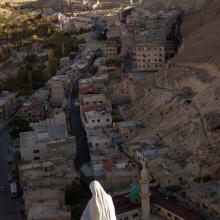rebels
FOR THE PAST year, life in the Central African Republic has been steadily spinning out of control.
Since the Seleka—or “alliance”—rebellion overturned the government in March 2013, there has been widespread insecurity and chaos. The U.N. Office for the Coordination of Humanitarian Affairs has called the situation a "mega-crisis."
Though the rebel movement began as a coalition of 5,000 fighters from a few rebel groups, it is now thought to have increased to 20,000, and there are credible reports that as many as 6,000 youth have been recruited into violent movements. Since December, at least 2,000 people have been killed and more than 700,000 displaced. And now there are legitimate fears of ethnic and religious “cleansing.”
To say that this conflict is about religion is a simplistic narrative. Yes, right now people are banding together with others who are like them—Christians with Christians and Muslims with Muslims. But for more than 50 years prior to the conflict, Christians and Muslims in the Central African Republic (CAR) coexisted in relative peace. From the beginning of the conflict, there were political and regional forces at work, and the Seleka forces happen to be primarily Muslim. And in retaliation for the violence and fear that came with the rebellion and the mostly untrained and loosely organized rebel fighters, fighters who happened to be Christian formed the anti-Balaka (“anti-machete”) militias. These fighters, most would agree, are not the best representatives of either faith, but they have taken over the narrative, and it is the civilians—many families and children—who suffer.
A huge statue of the Virgin Mary towers over churches, monasteries and mosques in the Syrian city of Maaloula, where a dialect of the Aramaic language of Jesus is still spoken.
The town has managed to stay out of the Syrian conflict between Sunni Muslim rebels and the regime of dictator Bashar Assad, as have most of Syria’s 2 million Christians.
But worsening violence has forced the community into a corner: Continuous clashes between the rebels and the regime in this isolated town of 2,000 people as well as other Christian towns over the past two weeks have many Christians worried that they will no longer be allowed to stay neutral.

